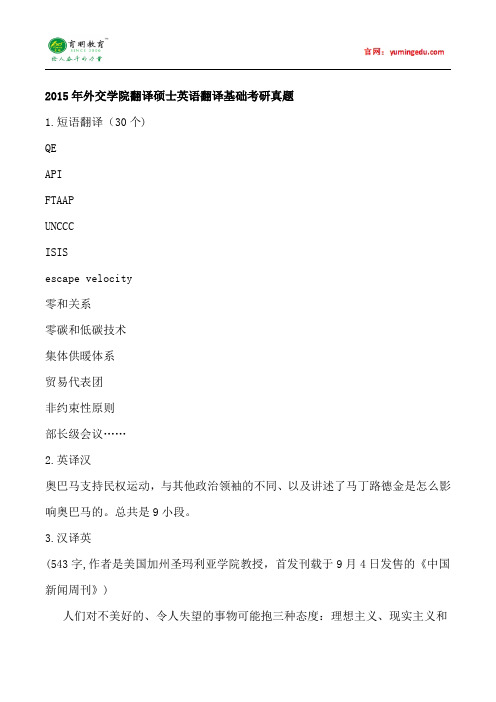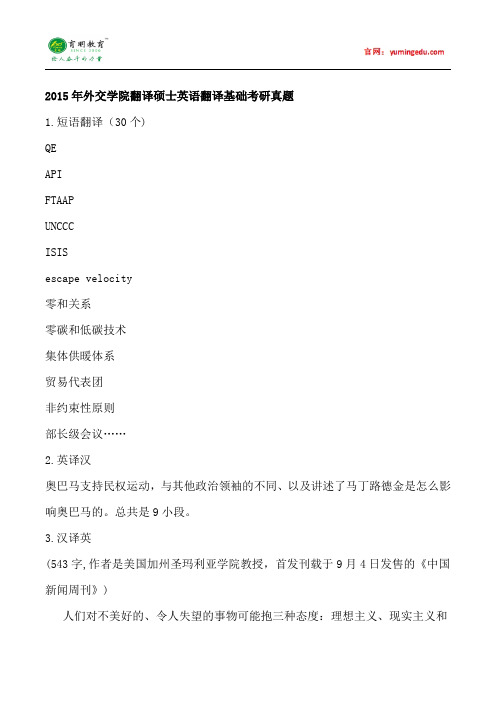2015年国际关系学院翻译硕士考研真题,参考书
- 格式:pdf
- 大小:227.59 KB
- 文档页数:4
![国际关系学院《357英语翻译基础》[专业硕士]历年考研真题详解专业课考试试题](https://img.taocdn.com/s1/m/e6a8a34f0975f46527d3e1e4.png)
目 录
2011年国际关系学院357英语翻译基础考研真题及详解
2012年国际关系学院357英语翻译基础考研真题及详解
2013年国际关系学院357英语翻译基础考研真题及详解
2014年国际关系学院357英语翻译基础考研真题及详解
2015年国际关系学院357英语翻译基础考研真题及详解
2016年国际关系学院357英语翻译基础考研真题及详解
2011年国际关系学院357英语翻译基础考研真题及详解一、词语翻译:英译汉(每题1分,总共15分) 1.European monetary integration
【答案】欧洲货币整合
2.fuel economic growth
【答案】拉动经济增长
3.junk bond
【答案】垃圾债券
4.caller ID telephone
【答案】来电显示
5.parkinsonism
【答案】帕金森
6.solar cell plate
【答案】太阳能电池板
7.open-ended fund
【答案】开放型基金
8.Gall up Poll
【答案】盖洛普民意测验
9.conditions-based withdrawal
【答案】有条件撤军。

2015年国际关系学院研究生入学考试《英语》真题(总分:100.00,做题时间:180分钟)一、Vocabulary and Grammar(总题数:20,分数:20.00)1.Some countries have no minimum drinking age-a conservative approach that leaves the issue _____ families rather than government bureaucrats.(分数:1.00)A.down toB.due toC.up to √D.on to【解析】句意:一些国家没有最低饮酒年龄,将问题留给家庭而不是政府官员,这是一种保守的做法。
leave sth. (up) to sb. to do sth.把……留交〔某人决定或负责〕;委托;交由。
故正确答案为C。
2.The "homeless" do not seek work or pride. They are satisfied to beg and survive _____ other's generosity.(分数:1.00)A.on √B.offC.withD.in【解析】句意: "无家可归者"不寻求工作,也不在乎自尊心。
他们满足于乞讨,靠别人的慷慨生存。
survive on靠……活下来,依靠某物继续生存。
故A正确。
3. I am not denying the moral obligation the community has to look after its disabled and aged. There are times, however, when an individual may find it pointless to _____ the fulfillment of legal and moral right.(分数:1.00)A.take toB.consist ofC.bring aboutD.insist on √【解析】句意:我不否认社区必须照顾残疾人和老年人的道德义务。


2015年外交学院翻译硕士英语翻译基础考研真题1.短语翻译(30个)QEAPIFTAAPUNCCCISISescape velocity零和关系零碳和低碳技术集体供暖体系贸易代表团非约束性原则部长级会议……2.英译汉奥巴马支持民权运动,与其他政治领袖的不同、以及讲述了马丁路德金是怎么影响奥巴马的。
总共是9小段。
3.汉译英(543字,作者是美国加州圣玛利亚学院教授,首发刊载于9月4日发售的《中国新闻周刊》)人们对不美好的、令人失望的事物可能抱三种态度:理想主义、现实主义和犬儒主义。
有研究者发现,这三种人生态度会分别在青年、中年、老年时期特别有影响。
人在十几、二十来岁的年轻时期,往往倾向于理想主义,特别有正义感。
一旦碰到不公不义、龌龊丑恶之事,便充满了愤怒,理想化地想要对它进行彻底的纠正。
打倒孔家店,推翻封建礼教,消灭封、资、修,占领华尔街,都是年轻人在那里冲锋陷阵。
中年的务实理想主义者希望能尽自己的力量做一些有益的事情:公益活动、议论时事、参与民间团体的活动等等。
他们很清楚自己所贡献的不过是绵薄之力,在有生之年也不可能期待实现多少实质性的变化。
中年的犬儒主义者则不同,他们会认为,这世界太丑恶,人心太坏,个人不可能改变这种状况,所以不值得为之付出努力。
既然如此,还不如随波逐流,有机会的就大捞一把。
有这种机会的毕竟只是极少数当上官的,大多数的中年犬儒会愤世嫉俗、玩世不恭、得过且过、难得糊涂。
碰到世道不平之事,他们只会冷漠地袖手旁观。
为了平息自己的良心责备,他们甚至还会站在加害者的立场上去责怪受害者——倒霉一定有倒霉的理由,谁叫他们自己拎不清,不当心,自作自受,咎由自取。
老年是最容易落入犬儒主义的人生阶段,一个人年岁越长,人生阅历也就越多。
老年人可以变得更智慧,但也可能变得更犬儒。
政府工作报告热词——宏观经济篇从紧货币政策tight monetary policy稳健财政政策prudent fiscal policy宏观经济调控macroeconomic regulation政府临时调控government interim intervention经济增长模式mode of economic development固定资产投资反弹a resurgence in fixed asset investment货币信贷投放仍然偏多continued excessive supplies of money and credit流动性过剩excessive liquidity转型过程transformation process行政手段administrative measures螺旋式通胀spiraling inflation通胀压力inflationary pressure抑制通胀to hold down inflation次贷危机subprime mortgage crisis经济剧烈波动drastic fluctuations in the economy经济过热economic overheating防止经济过热to prevent the economy from overheating促进结构调整和协调发展to promote structural adjustment and balanced development 减轻弱势群体负担ease the burden on the disadvantaged group增加对薄弱环节、改善民生、深化改革等方面的支出to increase expenditures necessary"to shore up weak links,improve people's lives and deepen reform"政府工作报告热词——就业篇严厉打击非法用工to severely punish illegal employment加强劳动争议处理to improve the handling of labor disputes加强劳动保障监察to improve oversight for worker protection measures就业促进法Employment Promotion Law劳动合同法Labor Contract Law城镇登记失业率registered urban unemployment rate鼓励创业to encourage business startups公共就业服务体系public employment service system完善再就业扶持政策to improve the aid system for job seekers“零就业”家庭zero-employment families就业机会employment opportunities非农产业nonagricultural sectors失业保险制度unemployment insurance system劳动力总量大增a large increase in the total workforce支持创办小型企业to support citizens to establish small enterprises鼓励自谋职业和自主创业to encourage people to find jobs on their own or start their own businesses加强就业和创业培训to strengthen vocational training and training in how to start a business城乡劳动者平等就业制度an employment system that treats urban and rural workers equally落实促进残疾人就业政策to carry out policies to find more jobs for people with physical and mental disabilities建立帮助零就业家庭解决就业困难长效机制to create a permanent mechanism to help zero-employment families find jobs通过加强就业和创业培训,鼓励自谋职业和自主创业,以及支持创办小型企业来扩大就业to expand employment"by encouraging and training business start-ups,strengthening job training,encouraging people to find jobs on their own,and supporting the establishment of small enterprises政府工作报告热词——国企篇国有企业state owned enterprises(SOEs)主要产业core business税收贡献tax contributions民航civil aviation所有制结构ownership structure发展大型粮食基地to develop large grain production bases国有资产所有权转移transferring ownership of state-owned assets完善所有制结构to improve ownership structure实行政策性关闭破产to carry out policy-mandated closures and bankruptcies建立国有资本经营预算制度to set up a budget system for managing state capital国有企业资产总额the total value of assets of state owned enterprises(SOEs)国有资产管理体制改革reform of the management system for state-owned assets国有经济布局与结构调整adjustment of the distribution and structure of the state sector建立和完善国有资产出资人制度to set up and improved a system for investors of state assets引入国有企业股份制to institute a stockholding system in SOEs邮政体制改革reform of the postal service system振兴老工业基地战略strategy of rejuvenating the old industrial bases国有企业改革改组改造reforming,reorganizing and upgrading SOEs深化国有企业股份制改革to deepen the reform to convert SOEs into stockholding corporations加强公司化管理to improve corporate governance实行政策引导关闭和破产to carry out policy-mandated closures and bankruptcies加快资源枯竭型城市经济转型to transform the economies of cities dependent on resource exploitation扩大建立国有资产管理预算系统试点to expand the experiment of setting up a budget system for managing state capital引入竞争,加强政府管理和公共监督,深化垄断企业改革to deepen the reform of monopoly industries by introducing competition and strengthening government regulation and public supervision严格国有资产转化为股份制企业的标准程序to strictly standardize procedures for transforming SOEs into stock companies资源型城市经济转型试点to transform the economies of cities dependent on resource exploitation严格规范国有企业改制和国有产权转让,防止国有资产流失to strictly standardize procedures for transforming SOEs into stock companies and for transferring ownership of state-owned assets to prevent their erosion主辅分离,辅业改制to separate SOE's secondary businesses from their core businesses and covert the former into independent company政府工作报告热词——能源、环境篇能源消耗energy consumption清洁、可再生能源clean and renewable energy sources化学需氧量chemical oxygen demand节能减排目标targets for saving energy and reducing emissions节能减排技术energy conservation and emission reduction technologies淘汰落后生产企业to close down backward production facilities加强先进生产能力建设to develop advanced production facilities城市污水处理能力urban sewage treatment capacity重点流域的污染防治pollution control in major river valleys and regions农村饮用水rural drinking water安全饮用水safe drinking water污染物排放emissions of pollutants资源节约型、环境友好型社会a resource-conserving and environmentally friendly society抓好重点企业节能和重点工程建设to focus on energy conservation in key enterprises and construction of key projects产品质量安全标准制定和修订the formulation or updating of national standards for the safety of food products,drugs and other consumer goods落实电力、钢铁、水泥、煤炭、造纸等行业淘汰落后生产能力计划implement the plan to close down backward production facilities in the electricity,steel,cement,coal and papermaking industries纠正招商引资中违法违规的做法to correct illegal practices for attracting foreign investmen限制和禁止高耗能、高排放和部分资源性外资项目to limit or ban foreign investment in projects that are energy intensive or highly polluting,limit or ban foreign investment in some areas of resource exploitation提高重点流域水污染物的国家排放标准。

2015年外交学院翻译硕士英语翻译基础考研真题1.短语翻译(30个)QEAPIFTAAPUNCCCISISescape velocity零和关系零碳和低碳技术集体供暖体系贸易代表团非约束性原则部长级会议……2.英译汉奥巴马支持民权运动,与其他政治领袖的不同、以及讲述了马丁路德金是怎么影响奥巴马的。
总共是9小段。
3.汉译英(543字,作者是美国加州圣玛利亚学院教授,首发刊载于9月4日发售的《中国新闻周刊》)人们对不美好的、令人失望的事物可能抱三种态度:理想主义、现实主义和犬儒主义。
有研究者发现,这三种人生态度会分别在青年、中年、老年时期特别有影响。
人在十几、二十来岁的年轻时期,往往倾向于理想主义,特别有正义感。
一旦碰到不公不义、龌龊丑恶之事,便充满了愤怒,理想化地想要对它进行彻底的纠正。
打倒孔家店,推翻封建礼教,消灭封、资、修,占领华尔街,都是年轻人在那里冲锋陷阵。
中年的务实理想主义者希望能尽自己的力量做一些有益的事情:公益活动、议论时事、参与民间团体的活动等等。
他们很清楚自己所贡献的不过是绵薄之力,在有生之年也不可能期待实现多少实质性的变化。
中年的犬儒主义者则不同,他们会认为,这世界太丑恶,人心太坏,个人不可能改变这种状况,所以不值得为之付出努力。
既然如此,还不如随波逐流,有机会的就大捞一把。
有这种机会的毕竟只是极少数当上官的,大多数的中年犬儒会愤世嫉俗、玩世不恭、得过且过、难得糊涂。
碰到世道不平之事,他们只会冷漠地袖手旁观。
为了平息自己的良心责备,他们甚至还会站在加害者的立场上去责怪受害者——倒霉一定有倒霉的理由,谁叫他们自己拎不清,不当心,自作自受,咎由自取。
老年是最容易落入犬儒主义的人生阶段,一个人年岁越长,人生阅历也就越多。
老年人可以变得更智慧,但也可能变得更犬儒。
百科知识--------名词解释近代史事件皖南事变:1940年10月19日,蒋介石命何应钦、白崇禧以国民党政府军事委员会正、副参谋总长名义致电八路军朱德、彭德怀和新四军叶挺、项英,强令在黄河以南的八路军、新四军于1个月内开赴黄河以北。

SECTION A: Translate the following underlined part of the Chinese text into English.(原文)哲学家们以各种各样的方式解释世界。
哲学是言而不是行。
哲学家断乎改变不了自然与社会。
是不能也,非不为也。
哲学不是科学技术,不是生产力。
哲学是怀疑,是思虑,是静观,是探索。
严格来说,哲学不是解释宇宙,那是自然科学的事。
哲学家至多只能解释人生,解释自己,解释文本。
哲学也不是知,不是知识体系,不是几何学、物理学那样一大套公理、公式,可以解决实际生存问题。
哲学的精神永远是探究、怀疑、发问、沉思;而不是提供现成的答案。
哲学家有些不食人间烟火,他远离田野车间,甚至也不拿天文望远镜观察观察天体,而只是坐在静谧的书斋里读书、思考,思索那些具有终极意义、虚无缥缈的本体问题。
哲学家孤苦伶仃,独处一室之中。
面对古往今来的大哲学家遗留下来的问题,他苦苦沉思。
他唯一富有的是文本,哲学因而就是解释文本,而不是解释宇宙。
哲学家只是一味地同古往今来的灵魂交谈--他读书,是同古昔人物交谈;他写作,是同子孙后代交谈;他讲演,是同莘莘学子交谈;他沉思,是同自己交谈。
他长于洞见,洞见未来;他善于遐想,遐想无限;他耽于梦幻,幻游彼岸;他富于关怀,关怀永恒。
他同远在天涯的哲人和精神交谈,在这个意义上,他视通万里,思接千载。
他伟大,他不朽,他同古往今来的灵魂对话。
以哲学为命运的人应当准备在崎岖小路上独行,没有目的,也不会有黄金滚滚而来。
告别鲜花、头衔、掌声和奖品,钟情于思,就会有真哲学。
(参考译文)Philosophers interpret the world through a myriad of ways. Philosophy is more speculative than active. In no way do philosophers transform nature or society. This is not because they do not wish to, but because they are unable to. Philosophy does not work the way that science and technology do, and for this reason, philosophy does not represent a form of production force. What philosophy does represent are skepticism, reflection, contemplation, and exploration.Strictly speaking, philosophy does not attempt at explicating the universe, a responsibility that primarily resides with natural sciences. At their best, philosophers can only interpret life, interpret themselves, and interpret texts. Philosophy does not pretend to be knowledge, hence it does not aim at the construction of a system of knowledge, dissimilar to geometry or physics whose colossal framework of axioms and formulas can provide immediate solutions to the pragmatic problems of human survival. The essence of philosophy lies in eternal questing, questioning, inquiring, and meditating. Philosophy is under no obligation to furnish ready and handy answers. To some extent, philosophers tend to refrain from any secular involvements. A philosopher seldom frequents farmlands or factories, and he even never bothers to look through a telescope to make any observation of celestial bodies. He is only fond of staying in his personal library, in all its quietude, where he indulges himself in book-reading and in musing, pondering on those intangible ontological issues that he deems to be of ultimate significance. A philosopher is willing to surrender himself to utter loneliness and seclusion, confining himself to a room of his own, in a state of overwhelming solitude. In the face of the philosophical issues left over by great philosophical thinkers ancient and modern, he contemplates painstakingly. The only wealth to his possession is texts. Therefore, the task of philosophy is to interpret texts rather than to interpret the universe.A philosopher is solely concerned with conducting dialogues with the great souls from ancient antiquity to the contemporary era. In reading books, he converses with the ancients. In writing hisown books, he converses with the progeny. In delivering lectures, he converses with a multitude of young students. In contemplating, he converses with himself. He is adept at insights, penetrating into the future. He excels in speculations, speculating on the infinite. He indulges in reveries, traveling in the otherworld in unbounded fantasy. He abounds in sympathies, concerned about the eternal. He converses with the philosophers and the great minds in the remotest corners of the earth. In this sense, his vision extends into the infinite distance and his thoughts are connected with the past and the future. His vision and thoughts transcend all spatiotemporal boundaries whatsoever. He is great; he is immortal; because he is in permanent dialogue with the great souls of the past, the present and the future ……A person who pursues philosophy as his destiny must be ready to trudge along a lonely path replete with twists and turns, purposelessly and aimlessly. Nor should he expect to reap any materialistic rewards. He should be fully prepared to bid farewell to bouquets of flowers, honorary titles, applauses, and prizes in favor of committing himself solely to a life of meditation and contemplation. Only in such a state will true philosophy be born.SECTION B:Translate the following underlined part of the English text into Chinese Translate the following into Chinese(2001)Until early in this century, the isolationist tendency prevailed in American foreign policy. Then two factors projected America into world affairs: its rapidly expanding power, and the gradual collapse of the international system centered on Europe. The watershed presidencies marked this progression: Theodore Roosevelt's (1) and Woodrow Wilson's (2). These men held the reins of government when world affairs were drawing a reluctant nation into their vortex. Both recognized that America had a crucial role to play in world affairs though they justified its emergence from isolation with opposite philosophies.Roosevelt was a sophisticated analyst of the balance of power. He insisted on an international role for America because its national interest demanded it, and because a global balance of power was inconceivable to him without American participation. For Wilson, the justification of America's international role was messianic: America had an obligation, not to the balance of power, but to spread its principles throughout the world. During the Wilson's Administration, America emerged as a key player in world affairs, proclaiming principles which, while reflecting the truisms of American though, nevertheless marked a revolutionary departure for Old World diplomats. These principles held that peace depends on the spread of democracy, that states should be judged by the same ethical criteria as individuals, and that the national interest consists of adhering to a universal system of law.To hardened veterans of a European diplomacy based on the balance of power, Wilson's views about the ultimately moral foundations of foreign policy appeared strange, even hypocritical. Yet Wilsonianism has survived while history has bypassed the reservations of his contemporaries. Wilson was the originator of the vision of a universal world organization, the League of Nations, which would keep the peace through collective security rather than alliance. Though Wilson could not convince his own country of its merit, the idea lived on. It is above all to the drumbeat of Wilsonian idealism that American foreign policy has marched since his watershed presidency, and continues to march to this day.America's singular approach to international affairs did not develop all at once, or as the consequence of a solitary inspiration. In the early years of the Republic, American foreign policywas in fact a sophisticated reflection of the American national interest, which was, simply, to fortify the new nation's independence. Since no European country was capable of posing an actual threat so long as it had to contend with rivals, the Founding Fathers showed themselves quite ready to manipulate the despised balance of power when it suited their needs indeed, they could be extraordinarily skillful at maneuvering between France and Great Britain not only to preserve America's independence but to enlarge its frontiers. Because they really wanted neither side to win a decisive victory in the wars of the French Revolution, they declared neutrality. Jefferson defined the Napoleonic Wars as a contest between the tyrant on the land (France) and the tyrant of the ocean (England) -in other words, the parties in the European struggle were morally equivalent. Practicing an early form of nonalignment, the new nation discovered the benefit of neutrality as a bargaining tool, just as many an emerging nation has since.(参考译文)直到本世纪初,孤立主义倾向在外交政策中一直大行其道。
2015年外交学院MTI翻译硕士英语考研真题基础英语1.20个单项选择。
考词汇和语法,专八水平。
2.10个改错。
给出一小篇文章,在10行画线句子中找错。
比专八改错简单些。
3.6篇阅读。
外院每年都是6篇阅读,前五篇是选择,题目难度不大,基本上都可以从原文中找到,但要细心。
其中还有一篇是要在几个句子里,选出填到原文空缺处的考题。
最后一篇有变化,去年是考的问答,今年是给文章的每一段选一个可以概括该段的句子,总共需要选出5个,但给出了10个选项,需要认真分析,仔细阅读。
4.作文。
The function of a university(at least400words)前面给了几句不同人的看法,关于大学要不要提供和工作有关的课程。
增词法与减词法翻译时无法一个萝卜一个坑,将原文中每一个词转换成译文中的另一个词,而应该有所增减,即有时需在译文中增加一些原文字面上没有的词语,有时则要将原文需要而译文显得多余的词省去不译,前者称为增词法,后者称为减词法。
不管增词还是减词,目的都是为了使译文变得更加通顺流畅,符合译入语的行文习惯。
采用增词法应特别注意:增词不增意,所增之词,其意义虽然在原文字面上没有清楚资料来源:育明考研考博官网地表现出来,但却隐藏在原文中,因此,增词法并未违背忠实原则。
同样,减词也不能减掉原文的内容,所减之词,其内涵虽然在译文字面上没有体现出来,却隐藏在译文中,因此,减词也没有违背忠实原则。
增词法与减词法在英汉互译中运用相当广泛,一般而言,增词和减词具有互逆性,即英译汉时需增词的场合汉译英往往需要减词;反之,英译汉时需减词的场合汉译英时则需增词。
翻译中之所以要采用增减法,是因为英汉两种语言在语法、词义、修辞、逻辑和文化等方面存在着某些差异。
具体而言,采用增词法与减词法主要为了达到如下目的:4.2.1弥合语法差异的需要英汉在语法上存在某些明显的差异,如英语有冠词,汉语则没有;英语多用代词,汉语虽然也用,但远不如英语那样频繁;英语介词丰富,被称为“介词的语言”,汉语则介词少,英语中很多需用介词的地方汉语要么用动词替代,要么不用;英语多用关联词语,汉语则少用关联词语,主要靠逻辑关系来铺排句子,强调意念的连贯性;汉语多用助词表示各种语气,英语则没有语气助词。
国际关系学院各专业考研情况一、复试时间与地点国际关系学院今年研究生复试时间为2012年4月14-15日,请参加复试同学注意自己报考专业的复试时间和地点,携带相关材料,准时参加。
中外政治制度、国际关系、外交学专业复试笔试时间:2012年4月14日下午13:30-15:30笔试地点:博学楼306教室国际关系专业复试面试时间:2012年4月15日上午8:30报到地点:诚信楼832会议室中外政治制度、外交学专业复试面试时间:2012年4月15日下午13:30报到地点:诚信楼832会议室二、复试规则1.坚持标准统一、程序公开、择优录取、宁缺毋滥的原则。
2.实行差额复试。
3.复试笔试时间为120分钟;每位考生的复试面试时间是20分钟。
4.考生通过随机抽签的方式选择复试面试顺序和复试面试题目。
三、复试考查的重点复试的重点在于考察与本学院的专业特点和培养目标有关的基本理论知识及其运用能力、学习能力以及英语能力。
四、复试方式及内容1.采用笔试加面试的方式,笔试和面试分别进行,笔试采取闭卷形式。
英语听力和口语测试在复试面试中进行。
2.复试内容按考生专业不同分别包括政治学、国际政治学、外交学等领域基本理论、基础知识及应用能力、与本学院的专业特点和培养目标有关的基本素质。
3.复试笔试成绩含:本专业基本能力、基础知识及应用能力:50%;英语写作和翻译能力:50%;复试面试成绩含:专业素质(专业知识、科研创新能力及学术成果等):30%,英语听说能力:30%,综合能力(社会实践情况、人文素养、沟通能力及培养潜质等):40%。
4.复试成绩为复试各方式考核成绩之和。
学院复试小组可根据需要会对部分考生进行二次复试。
最终总成绩=初试成绩百分制*70%+复试成绩百分制*30%;复试不合格者,不予录取;复试合格者,按照最终总成绩排序,上交研究生院,研究生院按照相关录取政策进行招生。
考前攻略:考研英语答题思路及时间控制距离2014年研究生入学考试很近了,所有考生在考试内容的复习上已接近尾声,现在希望广大考生放慢复习节奏,调整心态,将自己调整为考前最佳状态,争取将平时的积累最大化的发挥出来。
2015年外交学院翻译硕士英语翻译基础考研真题1.短语翻译(30个)QEAPIFTAAPUNCCCISISescape velocity零和关系零碳和低碳技术集体供暖体系贸易代表团非约束性原则部长级会议……2.英译汉奥巴马支持民权运动,与其他政治领袖的不同、以及讲述了马丁路德金是怎么影响奥巴马的。
总共是9小段。
3.汉译英(543字,作者是美国加州圣玛利亚学院教授,首发刊载于9月4日发售的《中国新闻周刊》)人们对不美好的、令人失望的事物可能抱三种态度:理想主义、现实主义和犬儒主义。
有研究者发现,这三种人生态度会分别在青年、中年、老年时期特别有影响。
人在十几、二十来岁的年轻时期,往往倾向于理想主义,特别有正义感。
一旦碰到不公不义、龌龊丑恶之事,便充满了愤怒,理想化地想要对它进行彻底的纠正。
打倒孔家店,推翻封建礼教,消灭封、资、修,占领华尔街,都是年轻人在那里冲锋陷阵。
资料来源:育明考研考博官网中年的务实理想主义者希望能尽自己的力量做一些有益的事情:公益活动、议论时事、参与民间团体的活动等等。
他们很清楚自己所贡献的不过是绵薄之力,在有生之年也不可能期待实现多少实质性的变化。
中年的犬儒主义者则不同,他们会认为,这世界太丑恶,人心太坏,个人不可能改变这种状况,所以不值得为之付出努力。
既然如此,还不如随波逐流,有机会的就大捞一把。
有这种机会的毕竟只是极少数当上官的,大多数的中年犬儒会愤世嫉俗、玩世不恭、得过且过、难得糊涂。
碰到世道不平之事,他们只会冷漠地袖手旁观。
为了平息自己的良心责备,他们甚至还会站在加害者的立场上去责怪受害者——倒霉一定有倒霉的理由,谁叫他们自己拎不清,不当心,自作自受,咎由自取。
老年是最容易落入犬儒主义的人生阶段,一个人年岁越长,人生阅历也就越多。
老年人可以变得更智慧,但也可能变得更犬儒。
4.2.2弥合词义差异的需要为弥合词义差异需要而采用的增词法或减词法一般有如下三种情况:一、我们在第三章中看到,在很多情况下,英汉词汇的语义范围往往有宽窄之分,并非一一对应。
2015年外交学院翻译硕士英语翻译基础考研真题1.短语翻译(30个)QEAPIFTAAPUNCCCISISescape velocity零和关系零碳和低碳技术集体供暖体系贸易代表团非约束性原则部长级会议……2.英译汉奥巴马支持民权运动,与其他政治领袖的不同、以及讲述了马丁路德金是怎么影响奥巴马的。
总共是9小段。
3.汉译英(543字,作者是美国加州圣玛利亚学院教授,首发刊载于9月4日发售的《中国新闻周刊》)人们对不美好的、令人失望的事物可能抱三种态度:理想主义、现实主义和犬儒主义。
有研究者发现,这三种人生态度会分别在青年、中年、老年时期特别有影响。
资料来源:育明考研考博官网人在十几、二十来岁的年轻时期,往往倾向于理想主义,特别有正义感。
一旦碰到不公不义、龌龊丑恶之事,便充满了愤怒,理想化地想要对它进行彻底的纠正。
打倒孔家店,推翻封建礼教,消灭封、资、修,占领华尔街,都是年轻人在那里冲锋陷阵。
中年的务实理想主义者希望能尽自己的力量做一些有益的事情:公益活动、议论时事、参与民间团体的活动等等。
他们很清楚自己所贡献的不过是绵薄之力,在有生之年也不可能期待实现多少实质性的变化。
中年的犬儒主义者则不同,他们会认为,这世界太丑恶,人心太坏,个人不可能改变这种状况,所以不值得为之付出努力。
既然如此,还不如随波逐流,有机会的就大捞一把。
有这种机会的毕竟只是极少数当上官的,大多数的中年犬儒会愤世嫉俗、玩世不恭、得过且过、难得糊涂。
碰到世道不平之事,他们只会冷漠地袖手旁观。
为了平息自己的良心责备,他们甚至还会站在加害者的立场上去责怪受害者——倒霉一定有倒霉的理由,谁叫他们自己拎不清,不当心,自作自受,咎由自取。
老年是最容易落入犬儒主义的人生阶段,一个人年岁越长,人生阅历也就越多。
老年人可以变得更智慧,但也可能变得更犬儒。
三.汉译英常用方法和技巧资料来源:育明考研考博官网与词有关的翻译方法包括:✓直译和意译✓词义的选择✓词的增补与省略✓词类转义法✓重复法✓正说反译法和反说正译法✓分句法和合句法第一节直译和意译首先应当指出,直译不是死译,而是指基本保留原有句子结构,照字面意思翻译。
16年翻译硕士考研详解与指导
21.五胡:匈奴、鲜卑、羯、氐、羌
22.“草木皆兵”出自(淝水之战)战争。
23.南朝均以(建康)为都。
24.(五代十国时期)中国的经济重心进一步向南方移动。
25.(元)朝建立了以后中国疆域的基础。
26.(明)朝资本主义开始萌芽。
27.(明)朝西方殖民者侵入澳门、台湾等地,开始了中国的殖民地史。
28.清朝政府在(康熙、雍正、乾隆)统治时期,把新疆、青海、蒙古、西藏纳入了中国的版图,奠定了中国今日的版图。
29.《南京条约》开放(广州、福州、宁波、厦门、上海)五个通商口岸。
30.洋务运动:第二次鸦片战争期间,西方列强的军事优势给曾国藩、李鸿章、左宗棠和恭亲王奕欣等人留下了深刻的印象。
他们主张利用西方技术,举办近代工业,用以维护清王朝的统治,这些人被称为“洋务派”。
19世纪60年代到90年代,洋务派采用西方科学技术,举办了近代军事工业、民用工业及新式学校,历史上称为“洋务运动”。
31.《马关条约》割让(台湾、澎湖列岛及辽东半岛)等地。
32.辛亥革命:1911年,孙中山领导的革命党在广州、武汶起义,并乘胜在南京组织临时政府,孙中山被
推举为临时大总统,末代皇帝溥仪宣布退位。
因为这一年是农历辛亥年,所以这次革命被称为“辛亥革命”。
1912年,“中华民国”成立。
辛亥革命是中国历史上第一次反帝、反封建的资产阶级革命,结束了中国两千多年的封建君主制度。
世界的普遍联系和永恒发展是通过一系列基本环节实现的,对于这些基本环节的逻辑反映就是辩证法学说
的基本范畴。
这些基本范畴从不同方面反映世界的普遍联系和永恒发展。
(1)原因和结果
原因和结果是揭示事物的前后相继、彼此制约的关系范畴。
客观世界到处都存在着引起与被引起的普遍联系,辩证法把这种引起与被引起的关系称为因果关系。
引起某种现象的现象叫原因,而被某种现象所引起的现象叫结果。
原因和结果的关系是辩证的:①原因和结果的区分既是确定的,又是不确定的;②原因和结果相互作用,原因产生结果,结果反过来影响原因,互为因果;③原因和结果互相渗透,结果存在于原因之中,原
因表现在结果之中;④原因和结果的关系是复杂多样的,有一因多果、同因异果、一果多因、异因同果、多因多果、复合因果。
正确把握事物的因果联系是自觉的实践活动的必要条件。
方法论意义:辩证地分析事物的因果关系,分析存在和发展的不同原因及其不同结果,可以增强人们活动的自觉性、预测性和调控性。
(2)必然性和偶然性
必然性和偶然性是揭示客观事物发生、发展和灭亡的不同趋势的范畴。
必然性是指事物联系和发展过程中一定要发生、确定不移的趋势。
偶然性是指事物联系和发展过程中并非确定发生的,可以出现,也可以不出现,可以这样出现,也可以那样出现的不确定的趋势。
必然性和偶然性是对立统一的关系:①二者是有区别的,它们产生的原因、表现形式、在事物发展中的地位和作用不同;②必然性和偶然性又是统一的,必然性存在于偶然性之中,通过大量的偶然性表现出来,并为自己开辟道路;偶然性背后隐藏着必然性,受必然性的支配,偶然性是必然性的表现形式和补充;必然性和偶然性在一定条件下可以互相转化。
方法论意义:要重视事物发展的必然性,把握事物发展的总趋势,又要善于从偶然中发现必然,把握有利于事物发展的机遇。
(3)可能性和现实性
可能性和现实性是揭示事物的过去、现在和将来的相互关系的范畴。
可能性是指事物发展过程中潜在的东西,是包含在事物中并预示事物发展前途的种种趋势。
现实性是指已经产生出来的有内在根据、合乎必然性的存在。
把握事物的可能性,要注意区分可能性和不可能性、现实的可能性和抽象(非现实)的可能性、好的可能性和坏的可能性。
没有现实就没有可能,反过来,没有可能就没有现实,它们在一定条件下相互转化。
方法论意义:立足现实,展望未来,注意分析事物发展的各种可能,发挥主观能动性,做好应对不利情况的准备,争取实现好的可能。
(4)现象和本质
现象和本质是揭示客观事物的外部表现和内部联系相互关系的范畴。
现象是事物的外部联系和表面特征,人们可通过感官感知;本质是事物的内在联系和根本性质,只有靠人的理性思维才能把握。
一方面,现象和本质是有区别的。
现象是事物的外部联系和表面特征,人们可通过感官感知,本质则是事物的内在联系和根本性质,只有靠人的理性思维才能把握;现象是个别的、具体的,而本质是一般的、共同的;现象是多变的,本质则是相对稳定的;现象是生动、丰富的,本质是比较深刻、单纯的。
现象有真象和假象之分,假象与错觉不是一回事。
另一方面,现象和本质又是统一的,它们相互联系、相互依存。
任何本质都是通过现象表现出来,没有不表现为现象的本质;任何现象都从一定的方面表现着本质,现象是本质的外部表现,即使假象也是本质的表现。
方法论意义:人们不能停留于现象而必须透过现象揭示本质。
人们正是通过对事物现象的去粗取精、去伪存真、由此及彼、由表及里的认识过程,才能不断深化对事物本质的认识。
透过现象揭示本质是科学研究的任务。
(5)内容和形式
内容和形式是揭示事物内在要素同这些要素的结构和表现方式的关系范畴。
内容是构成事物一切要素的总和,是事物存在的基础。
形式是内容诸要素相互结合的结构和表现方式。
任何事物的内容都有一定的形式,任何形式也都有一定的内容,没有无内容的空洞的形式,也没有无形式的纯粹的内容。
内容决定形式,形式反作用于内容。
当形式适合内容时,对内容的发展起着积极的推动作用,当形式不适合内容时,对内容的发展起着消极的阻碍作用。
方法论意义:既要重视内容,根据内容的需要决定形式的取舍、改造和创新;又要善于运用形式,发挥其积极作用,利用和创造必要的形式,适时地抛弃与内容不相适应的形式。
资料来源:。